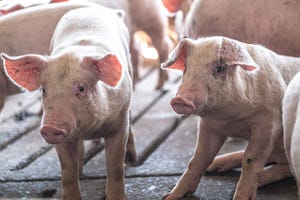Senate to debate Ag appropriations next week
Legislative Watch: House Freedom Caucus threatening shutdown; House Ag leader proposes reviving mandatory COOL; First lab-grown meat gets kosher stamp of approval.
September 8, 2023

The annual spending bills for the fiscal year beginning Oct. 1 remain stalled in the House of Representatives, but the Senate is poised to debate several of the less-controversial measures next week. Senate Appropriations Committee Chair Patty Murray (D-Wash.) and Vice Chair Susan Collins (R-Maine) announced they will put forward a “minibus” package next week combining funding for the Departments of Agriculture, Veterans Affairs, Transportation, Housing and Urban Development, and other agencies.
In a joint statement, the Senators said, “We are pleased to announce we are working to move ahead with the first package of appropriations bills on the Senate floor as early as next week. This summer, we worked with our colleagues in a bipartisan way to draft and pass out of Committee all twelve appropriations bills for the first time in years—and did so with overwhelming bipartisan votes. This is a critical next step as we continue working collaboratively in the Senate to keep our government funded, find common ground, and deliver for the people back home that we represent.”
The House returns from its August recess next week, but so far its leaders have struggled to forge a path forward on spending. Members of the right-wing House Freedom Caucus are openly threatening a government shutdown if their priorities are not included in any agreement, and Democrats are united in opposition to their demands. If no deal is reached, funding will expire at the end of the fiscal year on Sept. 30.
House Ag leader proposes reviving mandatory COOL
As the House and Senate Agriculture Committees work on their rough drafts of the next farm bill, members of Congress continue laying out their priorities by introducing legislation. Rep. Dusty Johnson (R-S.D.), an influential member of the committee who serves as a subcommittee chair, recently introduced H.R. 5215, the Beef Origin Labeling Accountability Act, which seeks to reinstitute mandatory country-of-origin labeling.
The bill would mandate that the U.S. Trade Representative “determine a means of reinstating mandatory country of origin labeling for beef that is in compliance with all applicable rules of the World Trade Organization.” The language would only apply to beef and requires the USTR to work with the Secretary of Agriculture to find the best way to reimplement MCOOL.
MCOOL was signed into law in the 2008 farm bill but faced immediate legal action from Canada and Mexico saying it violated free trade agreements. The U.S. lost multiple WTO cases on the issue before repealing MCOOL in 2015. Earlier this year, USDA issued a proposed rule creating guidelines for a voluntary COOL approach called “Product of USA” labeling. That proposal has faced criticism from both sides of the debate.
In a press release accompanying his introduction of the bill, Johnson said, “Consumers don’t know where their beef comes from. It could be South Dakota, Brazil or Canada. U.S. producers raise better beef, and they’re not getting the credit for it. My bill takes a step in the right direction to get accurate labels back on these products to increase consumer confidence in American-made and grown products.”
First lab-grown meat gets kosher stamp of approval
For the first time, a lab-grown meat product has received the approval of Orthodox Union Kosher, the world’s largest kosher certification organization. Israeli startup SuperMeat created a poultry product grown from egg stem cells that received certification as Mehadrin meat, the most stringent designation from the organization.
“It’s a big deal because just in terms of the technology itself, not just in poultry but in meat, it may have real significance for the future,” Rabbi Menachem Genack, CEO of the Orthodox Union Kosher Division, told the Times of Israel.
The Times reported that SuperMeat “hosted two rabbinic delegations and kosher authorities held a series of discussions on halacha, or Jewish law, and the science involved in the company’s technology” before receiving the designation.
A major reason SuperMeat was able to receive the kosher approval was its decision to begin with egg stem cells rather than cells from a live animal. According to Jewish law, products cannot be derived from a living creature. A larger test may come with lab-grown pork products, as pig meat is explicitly prohibited under the Torah’s pronouncements on kosher dietary law.
About the Author(s)
You May Also Like





